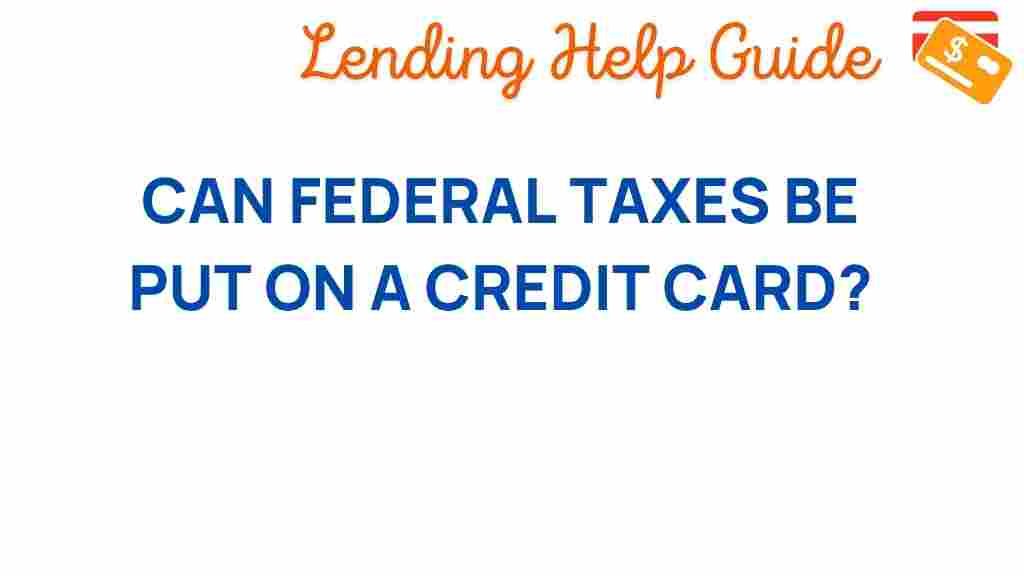Can Federal Taxes Really Be Charged to a Credit Card?
When it comes to managing your finances, the question of whether you can pay your federal taxes with a credit card often arises. The thought of using credit cards for tax payments can be appealing, especially if you’re looking to earn rewards or manage cash flow. In this article, we will explore the truth behind paying federal taxes with credit card payments, the available tax payment methods, and essential financial planning strategies for handling your tax liabilities.
Understanding Federal Tax Payments
Federal taxes are mandatory contributions imposed by the government to fund public services, infrastructure, and various programs. Understanding how to pay these taxes efficiently is crucial for proper budgeting and avoiding penalties.
There are several methods available for paying federal taxes:
- Direct bank transfer (EFTPS)
- Check or money order
- Debit card payments
- Credit card payments
Can You Pay Federal Taxes with a Credit Card?
Yes, you can pay federal taxes using a credit card. However, it’s essential to understand the implications associated with this payment method. The IRS does allow credit card payments through third-party processors. But keep in mind that this convenience comes with associated costs.
How to Pay Federal Taxes with a Credit Card
If you decide to pay your IRS payments using a credit card, follow these steps:
- Choose a Payment Processor: The IRS does not accept credit card payments directly. You’ll need to go through a third-party payment processor, such as PayUSAtax, Official Payments, or ACI Payments.
- Visit the Payment Processor’s Website: Go to the website of your chosen processor. Ensure that it’s a legitimate site. Research reviews and ratings if necessary.
- Enter Your Tax Information: Fill in the required information, including your Social Security number, tax form, and the amount you owe.
- Select Your Payment Method: Choose your credit card as the payment method. You will be prompted to enter your credit card details here.
- Review Fees: Be aware that the processor will charge a fee for this service, usually around 1.87% of the payment amount. Ensure you understand this fee before proceeding.
- Complete the Payment: After confirming all details, submit your payment. You should receive a confirmation number—keep this for your records.
Considerations Before Paying Taxes with a Credit Card
While paying your federal taxes with a credit card can provide flexibility, consider the following:
- Credit Card Fees: The fees charged by payment processors can add up. Calculate if the convenience outweighs these costs.
- Interest Rates: If you cannot pay off your credit card balance immediately, you may incur high-interest charges. This could lead to greater financial strain.
- Rewards: Some credit cards offer rewards for spending. If you can pay off the balance before interest accrues, this could be a beneficial strategy.
Tax Strategies for Managing Payments
When it comes to financial planning and tax strategies, understanding how to manage your tax payments effectively is essential. Here are some strategies to consider:
- Budgeting: Allocate a specific portion of your monthly budget to cover potential tax liabilities. This can alleviate the financial burden when it comes time to pay.
- Estimated Taxes: If you’re self-employed or have other income sources, consider making estimated tax payments throughout the year. This can help you avoid a lump sum payment at tax time.
- Tax Deductions: Familiarize yourself with available deductions to lower your taxable income. This can reduce the amount you owe and help with budgeting.
- Consult a Tax Professional: If you’re unsure about your tax situation, consulting a tax professional can provide tailored advice and strategies.
Troubleshooting Common Issues
When paying your federal taxes with a credit card, you may encounter some common issues. Here are tips to troubleshoot:
- Payment Not Processed: If you receive a notification that your payment was not processed, verify your credit card information, and contact the payment processor for assistance.
- Fees Not Displayed: If you do not see the processing fee before completing your payment, ensure you read all prompts carefully. If fees seem excessive, consider using another payment processor.
- Confirmation Issues: If you do not receive a confirmation number, do not assume your payment went through. Check with the payment processor and the IRS.
Conclusion
In conclusion, while you can pay your federal taxes using a credit card, it is vital to weigh the benefits against the potential costs. Understanding tax payment methods, associated credit card fees, and developing sound financial planning strategies can help you manage your tax liabilities effectively. Utilizing credit cards for tax payments can be a useful tool when done thoughtfully, but always prioritize your financial health and long-term budgeting goals.
For more information on managing your taxes and payment options, visit the IRS website for official resources.
Additionally, if you’re looking for more tips on financial planning and tax strategies, check out our detailed guide on effective budgeting techniques.
This article is in the category Debt and created by LendingHelpGuide Team
